Living the Word

YOU, FAITHFUL CHURCH workers, have survived the demands of Lent, Holy Week, Easter, and Pentecost, and I’m willing to wager you are tired. By this time in the liturgical cycle, I’m usually exhausted and my spiritual (and sometimes physical) walk includes a pronounced limp. Vocational and social demands have taken their toll, not to mention the profound collective trauma we have all been through. Two years ago this summer, the waves of direct action in response to the police killings of Breonna Taylor and George Floyd left many of us particularly drained. And the shootings have not stopped. We have all done and been through so much.
Throughout the New Testament, the text refers to faith using the Greek word pistis. That word can also translate as faithfulness, a dogged determination that refuses to acquiesce or let anyone stifle it. It’s the same faith exercised by the woman with the flow of blood and shown in the litany of ancestors in Hebrews 11. It is more than sentimental, and sometimes is best exercised by simply being still and remembering who God is.
Our scriptures this month encourage us to exercise and examine our faith so that we keep going forward, even if we must stop and reset ourselves. Whether our posture is active or passive, our faith is still called into action because the world needs our witness.

MY PARENTS WERE raised watching Westerns in which the tropes were all the same: There were “good guys” and “bad guys.” I was raised on Disney movies with similar tropes. There was little moral complexity in these stories, which I suspect reflects our tendency to look at the world in terms of a good/bad dichotomy. Reality is much more nuanced. I appreciate the way that popular 21st-century movies have embraced some of that nuance. One example is the Oscar-winning film Crash, a complex racial narrative released in 2004. An antagonist police officer in the movie’s opening becomes a hero by the end, while his idealistic partner takes the inverse path. It’s never totally apparent who the “villains” and “heroes” are. While I think our investment in the good/bad dichotomy is still substantial, it seems popular culture might agree with the psalmist who says, “there is none who does good” (Psalm 14:3).
Our willingness to accept human complexity is key to our ability to reshape ourselves into more just communities. Today, we see state legislatures seeking to prohibit educators from teaching uncomfortable truths about our country’s past because of the dominant culture’s inability to confront that truth. I remember the words of James Baldwin: “Not everything that is faced can be changed; but nothing can be changed until it is faced.” The scriptures for this month help us change what needs to be changed by facing it and trusting in God’s ability to move us forward.
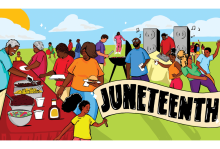
THE MONTH OF June will require spiritual caregivers to take note of tensions. We begin with the celebration of Pentecost, known as the “birthday of the church,” which will undoubtedly be a day of great joy for the faithful. But later in the month, we mark the grim anniversaries of shootings at Mother Emanuel AME Church in Charleston, S.C., and Pulse nightclub in Orlando, Fla. We will celebrate people who father, and we will wrestle with complicated feelings about the fathers in some of our lives (and even contend with heteropatriarchy in our structures and theology). And we will celebrate the Juneteenth holiday while this nation still incarcerates Black bodies at disproportionate rates and refuses federal protections against voter suppression.
Pentecost invites the church to consider our Spirit-given power to share the gospel, speak with authority to all corners of the earth, and set the captives among us free. It may be that we find ourselves working for equity and liberation harder than we ever have before, and a pandemic has only exacerbated our fatigue. But hopefully this will be an opportunity to go back to the well of the Spirit and draw nourishment for our continued journey. We are not alone, and no one is expected to single-handedly carry the work. The same power that increased the church’s number by 3,000 on its first day is still with us. This, siblings, is good news, because we will need that power for the work we still must do.
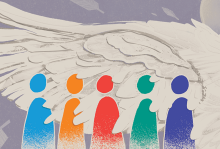
TO WHOM DO our lives belong? The Barmen Declaration, written in 1934, was a theological statement by a small group of German Protestants in response to the growing pro-Nazi movement within German Christianity. It stated, “We reject the false doctrine, as though there were areas of our life in which we would not belong to Jesus Christ, but to other lords—areas in which we would not need justification and sanctification through him.” The signers of the Barmen statement said this because the confederation of German Protestant churches (which would eventually become the state church under the Nazi Third Reich) was demanding allegiance to the state in all areas of life and faith. The close of Eastertide gives us an opportunity to consider, in our own time and place, to whom we belong and what that means for how we live now amid echoes of authoritarianism.
In this season, we read of Jesus’ growing influence and what it meant for his disciples to reckon with a world in which resurrection is possible. If the threat of death is muted, if not even prison can contain the good news, then how emboldened will a small-but-mighty movement become in the face of a powerful empire and its proxies? Can this good news still reach us—we who are worn from the immense grief of the last two years? Can we find our second wind to share this good news and build God’s reign? I believe Eastertide has a particular resonance for these times.

WE TEND TO approach Lent passively. Some of that is appropriate. After all, we start Lent by putting ashes on our heads to symbolize our grief, and grief often makes us more still. But Lent is a season of intentional activity. To repent is to shift course. We continue to move, but in a different direction. We walk with God, following where God leads, no matter what we must leave behind.
This journey eventually leads to the cross, and later to resurrection. That’s when we find the journey has just begun. We were made to seek God, to question, to be in tension with mystery, to wrestle with God like Jacob, and to eventually find what we’re looking for. And when we come into contact with God in whatever ways are possible, we realize we cannot serve this God as one would serve an idol. We cannot operate out of empty ritual or rote adherence to any custom. We can’t appease or bribe this God. This God is not confined to our shrines, nor does God thrive off our material gifts and sacrifices. What this God wants is much more profound: repentance, trust, and a complete reorientation of one’s heart away from self and toward companionship with God. Many who’ve prepared to walk the Camino de Santiago pilgrimage did so by training on their own trails for months before making the trek. Lent similarly trains us for a lifelong journey of resilience, trust, and resistance to the forces of evil and despair.

A CURIOUS THING happened among many congregations in my very white denomination after George Floyd was killed: Churches that had been at best timid to enter the work of racial justice dove into it headfirst. Colleagues dusted off their blogs to share their thoughts. Church leaders laced up their sneakers to participate in marches. It appeared that a reckoning had occurred for countless people in the faith. They finally got it and could no longer stay silent, not while a global pandemic amplified the existing inequities in our society. It was time to act.
This would seem like good and right action, except many began this work having previously wounded leaders of color who’d tried for years to call them into it. Worse yet, there was little to no attempt to remedy their errors or circle back with the people they’d hurt. They were eager to move toward action but had to be reminded that the past still needed to be addressed before the future could be entered with justice.
If there is a “right” way to approach Lent, it involves holding our past and future in tension. The Greek words for repentance and reconciliation both connote a reciprocal change. The person on a wayward path makes a U-turn. The transgressor trades places with the transgressed. Our texts challenge us to examine who we have been, are, and are willing to become, because all of it matters to the future we will build.

EPIPHANY IS NOT an all-at-once revelation of God’s presence with us in the person of Jesus Christ. The entire world was not made aware of Jesus’ arrival at the precise moment it happened. The Magi didn’t make their trek to see the Christ child until he was a toddler. Often Jesus’ own disciples didn’t know who he was when they first encountered him. And little if any positive change occurred in the sociopolitical climate for Israel. The reveal of the Messiah’s identity, and the change that would come with it, happened at a painfully slow pace.
In February, we continue the journey of revelation. We recall stories from the Hebrew Bible and Christian Testament of longing and resignation that give way to revelation and encouragement. We see how the faithful through the ages held onto faith as they faced great threat. We see how, despite the prosperity of the wicked, they somehow recognized the hand of God at work.
Perhaps we find ourselves proclaiming to a people who thought a new administration or other promising change would usher in more favorable conditions. Perhaps we personally struggle with how to hold onto hope, not to mention how to encourage our communities to do it. These Epiphany season texts hold us in our lack of clarity and waning faith, reminding us that we are not alone. While we await a substantive change, may the text in some way help our unbelief.

I’M NOT SURE where I thought we would be by now, but I didn’t think we’d be here. A global pandemic has ravaged and killed too many of our loved ones to name, though we could have contained it through collective measures. Climate change continues unabated despite decades of warning and appeal, and we may have missed our window to prevent its worst impacts. We’re experiencing perils that are unnecessary and completely caused by our selective will.
Christmastide and the Epiphany season are opportunities for us to recall and perhaps draw hope from the story of God’s inbreaking into a desperate human condition. But we must also remember that, despite God’s extraordinary proximity to humanity in those days, trouble persisted. Jews were still under a repressive occupying power. They were worshipping in a temple built by a leader invested in his own oppression, put in power by their oppressor. Very little seemed to change. If anything, it appeared to get worse.
As with the people in those times, so it is with us today. We who read the text get a peek behind the veil of worldly power to see what God was doing in the shadows. We see what was obscured from those who cried to their Creator or who’d perhaps run out of tears to shed. We see what they could not see at the time. The preacher and teacher will need to pull back anew this curtain for the people—and for self.

ON SUFJAN STEVENS' 2012 Christmas album, Silver & Gold, he includes “Ah Holy Jesus,” a hymn about Christ’s crucifixion. Stevens sings: “For me, kind Jesus, was thine incarnation / thy mortal sorrow, and thy life’s oblation / thy death of anguish and thy bitter passion / for my salvation.” The cross on Golgotha casts a long shadow toward Bethlehem. When the child in the manger grows into adulthood, our world kills him. The story of the incarnation is the story of crucifixion.
For Stevens to sing such a hymn during this season reminds us that Jesus was born into an anguished world—an anguish that took hold in his life, an agony unto death. “The whole life of Jesus comes under the heading ‘suffered,’” theologian Karl Barth commented. “For the evangelists Luke and Matthew, the childhood of Jesus, his birth in the stable of Bethlehem, were already under the sign of suffering,” Barth continued. “The entire life of Jesus is lived ... in the shadow of the cross.”
Jesus didn’t offer salvation as an escape plan from our life’s travails but as a commitment to heal us from the habits of sin, the violence that cuts through each of us and the world. Christmas Day doesn’t redeem our wounded world in an instant—as if the old order vanishes with the newborn’s first cry. Instead, Jesus undergoes a human life and entrusts our lives to the Holy Spirit’s care.
Salvation is a salve, the soothing presence of the Spirit. This same Comforter took care of Mary at Jesus’ birth and ministered to him during his passion. “For me, kind Jesus, was thine incarnation ... and thy life’s oblation.”

THE BIBLE IS about scrappy people. We read about communities that pass along wisdom, from one generation to the next, on how to survive (despite the violence that threatens their existence) and on faith in God, which keeps their hope alive. We worship the God of Exodus who leads people out of oppression. I believe in God’s ongoing work of liberation. However, the Exodus shouldn’t be the only lens through which we discern God’s action in our world. When the version of liberation found in Exodus becomes our central frame to recognize the characteristics of God’s presence, we occlude from our vision the Spirit’s prosaic and laborious provisions of survival.
In her landmark Sisters in the Wilderness: The Challenge of Womanist God-Talk, theologian Delores S. Williams turns our attention to the witness of Black women who create communities of survival. She writes about the “art of care” and the “art of connection” as survival strategies of Black women. Her guide is Hagar, a biblical character who struggles to piece together life in the wilderness after Abram and Sarai—with God’s sanction—banish her from their household. “We can speak of Hagar and many African American women as sisters in the wilderness struggling for life,” Williams explains, “and by the help of their God coming to terms with situations that have destructive potential.”
Our scriptures this month don’t imagine spectacular visions of liberation. Instead, they invite us to live out our hope within the wilderness—with Williams and Hagar—as we become people of refuge. We pass along God’s grace in our arts of survival and mutual care.
PASSAGES FROM THE book of Hebrews show up in the lectionary every Sunday this month. In Ernst Käsemann's landmark book The Wandering People of God, written in the context of 1930s Germany, this pastor and theologian characterizes the community described in the Epistle to the Hebrews as a people who wander in the wilderness of this world. “The basic posture of the bearer of [God’s] revelation should, in fact, be described as a wandering,” Käsemann writes; “the attitude of faith can only be described as wandering.” He locates the identity of the church in the biblical stories of Israel in the wilderness—the church as a people estranged from imperial power.
“I of course had in mind that radical Confessing Church which resisted the [Nazi] tyranny in Germany,” Käsemann wrote decades later, reflecting on his book as anti-fascist ecclesiology—a biblical theology for a German antifa church movement. When a society coheres around a nationalist identity that designates segments of the population as “other” and therefore a threat to patriotic unity, “the church must appear as a band of deserters.” To desert such nationalistic ideologies is to wander in search for Jesus because, according to Hebrews, he appears at the edge of society, outside the civic union, beyond the border—Jesus as the one who suffers “outside the city gate,” on the other side of the wall (Hebrews 13:12).
The last chapter of Hebrews invites the faithful to solidarity with Jesus, which involves a commitment to excluded people, to scapegoated populations: “Let us then go to him outside the camp and bear the abuse he endured” (Hebrews 13:13).

MOST OF THE friends I grew up with in church youth group don’t call themselves Christians anymore. They left church behind years ago. Yet here I am, still a very churchy Christian. Why have I stayed in the faith after all these years? Why do we keep doing this Christian thing?
We are tempted to convince ourselves that God will reward our faithfulness with blessings—either in this life or the next. This is a Christian logic as old as the Bible, a theology taken from the lips of Jesus himself: “Your Father who sees in secret will reward you” (Matthew 6:4). Prosperity theology isn’t an aberration but a perennial Christian impulse, an urge within all of us as we try to justify to ourselves our faith.
This way of thinking about beliefs, according to Meister Eckhart, turns God into a cow. “People look upon God with the eyes with which they look upon a cow,” he preached in the 14th century. “To love God the way they love a cow, because it gives you milk and cheese. This is how people behave who want to love God because of external wealth or inner comfort ... they love their self-interest.”
This month’s stories from Mark’s gospel invite us into the disciples’ struggle to understand why they’ve chosen to follow Jesus. Discipleship, we’ll discover, is a constant exposure to the selfish motives for our faith as we stumble into God’s truth—that, as Eckhart preached, “God loves us without a why.” God loves us without a reason, without making calculations. God loves us because God loves us.
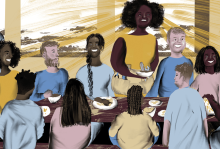
WE LONG FOR new beginnings, a restart, to go back in time to correct our mistakes or dodge the harm someone has done to us. But those former lives are inaccessible to us. All we have is this life now. Here we are in the middle: after the beginning and before the end. Usually we associate “middles” with “stuckness”—not the excitement of the new and not the relief of an end but locked in between. For example, the morass that prompts a midlife crisis, that languorous experience of the middle of life that leads to the purchase of a motorcycle.
In the church calendar, we’re in the season called “ordinary time,” a long stretch of weeks between Pentecost and Advent. These are the middle months where the scriptures plop us into the middle of stories. And that is where we find Jesus. The incarnation is an act of God in the middle of Israel’s story: not the beginning, not the conclusion, but God-with-us in the middle. This season of unceasing tedium has also been taken up into the life of God. Perhaps we could describe the incarnation as the midlife crisis of God?
Jesus is the one who has been with us from before the beginning, who has witnessed the groaning of all creation, the births and deaths and the life in between—and comes to us now, where we are, in our midlife, with our regrets and unfulfilled dreams, and guides us as we wander into the ordinary goodness of life.

GOD IS NOT a neutral observer of our worldly affairs. “God takes sides,” the Brazilian theologians Clodovis and Leonardo Boff explain in Introducing Liberation Theology. God is not a dispassionate consultant, nonpartisan mediator of divisions, or a disinterested negotiator of political antagonisms. “God takes sides and comes on the scene as one who favors the poor,” Mexican theologian Elsa Tamez writes in Bible of the Oppressed. “The God of the biblical tradition is not uninvolved or neutral,” U.S. theologian James H. Cone argues in A Black Theology of Liberation. “God is active in human history, taking sides with the oppressed.”
God has already decided to live in solidarity with people who have survived injustice after injustice. The incarnation reveals the partisanship of God—that, in Jesus, God becomes one of the “disinherited,” to use Howard Thurman’s language. The life of Jesus is the story of how God takes the side of “people who stand with their backs against the wall,” as Thurman puts it in Jesus and the Disinherited, populations “disinherited from participation in meaningful social process,” groups segregated from “any stake in the social order.”
The Bible passages this month call us to examine where we stand. They illumine the borders of power—the divide between privilege and oppression that slices through our communities—and prod us with a question: Which side are you on?

DURING THESE LONG months of pandemic, I’ve returned to the 14th century writings of Julian of Norwich, a theologian who lived through seasons of plague as a child. She lost neighbors and loved ones. Later, as an adult, she almost died from a mysterious illness. After her recovery, Julian received visions from God that she wrote down in a book of theological reflections.
God “made everything that is made for love,” Julian writes, “and the same love sustains everything, and shall do so forever.” On page after page of Revelations of Divine Love, Julian dwells on God’s steadfast care for all of creation. She offers—to herself and to her readers—words of comfort and hopeful reassurances (“All shall be well, and all shall be well, and all manner of things shall be well”), while staring clear-eyed at a life of suffering (“all the pains and sufferings of all creatures, both in body and spirit”).
When I can’t sleep, I repeat Julian’s line in my mind. “All shall be well, and all shall be well.” Her words have accompanied me through night after night of pandemic anxieties and despair. Her repetitions (“all shall be well, and all shall be well”) remind me of Psalm 130: “My soul waits for God more than those who watch for the morning, more than those who watch for the morning” (verse 6). We wait and watch for the glow of morning, for redemption’s dawn when all shall be well.

DO WE KNOW what we even mean when we say “God”? In the wake of the crucifixion, with our theological grammar shattered on Golgotha—where, in Jesus, God died—the events of Easter have us fumbling for new words.
To speak of our faith involves piecing together syllables into phrases that venture to say the unimaginable. The resurrection shocks us out of familiar patterns of thinking about God—an unsettling of our minds but also our lives. That is what we see on Pentecost: a bewilderment. People lose control of their tongues. The Spirit dispossesses the leaders of their power over communication. God reorders their movement with the invitation of the gospel. Pentecost morning concludes with an evening of food and fellowship, “the breaking of bread and prayers,” communion among strangers (Acts 2:42).
The Holy Spirit instigates a reformation of our communities as part of how we articulate the Word of God. “We need to find a new language,” writes Catholic theologian Rosemary Radford Ruether in Sexism and God-Talk, “that cannot be as easily co-opted by the systems of domination.” Habits of life accompany habits of speech. The events of Pentecost reveal a Spirit who refuses to honor our hierarchies of authority, of who represents God. From this primal episode in Acts, the church becomes a movement that transgresses the borders between insider and outsider, neighbor and foreigner, friend and stranger.
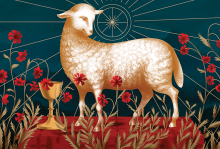
“THEY WERE AFRAID.” Those are the last words of the earliest manuscripts of Mark’s gospel (16:8)—the oldest of the four gospels. Mark ends his story about Jesus with Mary Magdalene, Mary the mother of James, and Salome at the empty tomb. Terror seizes them. They flee in shocked silence. The end. What kind of Easter is this?
Scribes and theologians thought the same, so a couple centuries later they added different endings to Mark—easier endings, with Jesus coming back to offer further teachings. In Mark’s original Easter account, however, there is no resolution to the story. Instead, we read about three women at a tomb, bewildered. Here, resurrection doesn’t resolve anything. Instead, the event unsettles. The absence of a corpse provokes questions and invites a hope in the promise of unimaginable possibility. “Jesus is going ahead of you to Galilee,” a strange messenger in the empty tomb tells them, “there you will see him.”
Easter is an ending without a conclusion, a story without finality. The end returns us back to the beginning—to Galilee, where Jesus was born, where he was baptized, where he gathered disciples, where he healed the sick, fed the hungry, and preached good news. Resurrection means that nothing, not even death, will prevent Jesus’ invitation for us—who are weak and fearful, bewildered by a world we can’t control—to follow messengers who guide into the mysteries of Christ in the here and now.

“WE'RE CAPTURED by sin, we’re captive to a power,” said theologian Stanley Hauerwas, “not as something so much that I do as something that I’m captured by and that I don’t even recognize as captivity.”
In this month’s scriptures, we confront the captivity of sin—social forces that diminish life, powers of oppression that colonize our desires. Sin whispers lies about the world, deceptions that lead to harmful acts—harmful for our personal lives with neighbors and our collective lives as a society.
The gospel passages assigned for the first and last Sundays spotlight the sinful power of money—from the marketplace’s corruption of the temple courts to Judas Iscariot’s betrayal of Jesus in exchange for silver. Money bookends Lent. We cannot talk about Jesus without talking about how mammon worms itself into our longings—the allure of wealth, the power of profits.
Jesus enacts liberation from the sinfulness of the thrall of money. In John 2, Jesus frees people from money’s bondage by scattering gold and silver in the streets. He seizes the currency of the bankers. He redistributes the wealth of the few into the pockets of the many. The reign of God will involve an economic overhaul. Lent would be a fitting season to tax the rich and to cancel student and medical debt.

THE CHRISTIAN LIFE returns again and again to prayer. We pray by ourselves, and we pray with others. Worship draws us to the scriptures, with the psalter at the center of the Bible, which bears witness to the back-and-forth, the disagreement and commitment, the frustration and intimacy, of God’s communication with God’s people—a textual record of conversations across the ages.
With the guidance of these holy words, prayer transfigures us with divine communion, our lives caught up in the life of God. We find ourselves with the disciples when Jesus takes them up the mountain, where “he was transfigured before them” (Mark 9:2). We are Jesus’ companions. He welcomes us into a life of prayer, which is our union with God.
In After the Spirit, theologian Eugene Rogers uses the traditional language of church doctrine to describe this process of deification. “The Holy Spirit incorporates human prayer into the prayer of the Son to the Father.” In the biblical scene, we are standing there with Jesus on the mountain as the thick presence of heaven descends on him like a cloud (Mark 9:7). “Prayer is a transfiguration of human beings,” Rogers explains. This story is about our participation in the trinitarian life of God.
The Bible passages this month lead us from Epiphany to Lent, with Transfiguration Sunday as our transition from one season to the next. During Lent we open ourselves to how the light of Epiphany’s revelations about God exposes sin’s insidious powers in our lives and in the world.
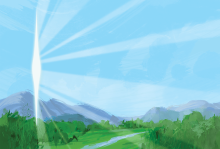
THESE SCRIPTURES move with us from Christmas to Epiphany, drawing us into the mysteries of the divine life in the world. The incarnation is a call to notice where the Spirit surprises us with God’s presence. Dominican theologian Herbert McCabe guides our vision: “Christ is, indeed, to be found in the present but precisely as what is rejected by the present world,” he writes. Christ “is to be found in those who unmask the present world, those in whom the meaninglessness and inhumanity and contradictions of our society are exposed.” God’s mysteries are revealed among the rejected and despised, the people who expose society’s promises as the hypocrisies of political brokers who ensure the prosperity of the millionaires and billionaires—and, soon, the world’s first trillionaire.
To believe these scriptures about God’s presence is to realign our solidarities, to become conspirators with the One whose justice is liberation from the economic, political, and social patterns that are destroying life. These structures that organize our world for the benefit of the powerful are in the midst of collapse. They are “passing away,” as Paul claims. We’re always living through human self-destruction, with the United States as an instance of history’s cycles of cataclysm. If we want to go on in hope, then we must love those God has created, and give ourselves to the despised and rejected, to our neighbors caged in prisons and segregated from us by the border. There, God will astonish us with epiphanies: life’s survival on the underside of history.